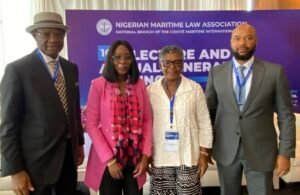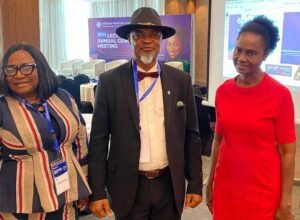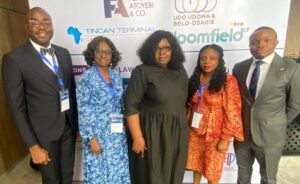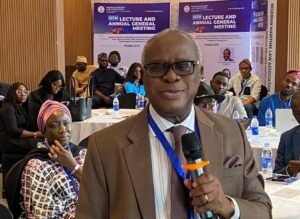
Oduwole seeks legal modernisation to drive Nigeria’s multimodal transport
Lagos, November 14, 2025: Minister of the Industry Trade and Investment, Dr Jumoke Oduwole, has emphasised the urgent need to modernise Nigeria’s transport laws to match rapidly evolving global supply chains.
Oduwole who was represented by the Legal Adviser, Lagos State Waterways Authority (LASWA) made the call in her keynote address at the 16th Lecture and Annual General Meeting of the Nigerian Maritime Law Association (NMLA) held on Friday in Lagos.
The lecture, which has the theme, “The Future of Multimodal Transport in Global Trade: Evolving Carriage Regimes, Enforcement Mechanisms and Legal Certainty”, examined the transformation of global logistics and its implications for Nigeria.
Oduwole said transport systems across sea, road, rail, air and inland waterways are advancing far faster than the legal instruments that guide them.
She described the gap as a major threat to the nation’s Blue Economy ambitions.
“Modernising transport networks and strengthening regulatory environments are essential to protecting shippers and carriers, boosting investor confidence, and integrating our economy more deeply into global trade,” she said.
Oduwole noted that global trade is now centred on seamless, origin-to-destination delivery anchored on clear liability rules, safety standards and strong enforcement systems.
“The future of trade will be determined by two factors: how efficiently goods move and how clearly the law governs that movement,” Oduwole said.
The minister highlighted the need to adopt evolving carriage regimes and stronger enforcement mechanisms, especially as Nigeria works to strengthen its competitiveness under the African Continental Free Trade Area (AfCFTA).
She reviewed the Hague, Hague-Visby and Hamburg Rules, staples of maritime law, but noted their limitations in the era of multimodal and digitalised supply chains.

Oduwole pointed to the Rotterdam Rules as a model for modern frameworks that support electronic documentation, single multimodal contracts and greater carrier responsibility.
“These rules provide key insights, including a single contract for multimodal transport, recognition of electronic transport records, extended responsibilities for carriers and enhanced transparency,” she said.
Oduwole identified fragmented liability as one of the biggest obstacles in multimodal logistics, where cargo often moves across vessels, trucks, barges and warehouses under different and unclear rules.
“As we develop major logistics assets such as the Lekki Deep Sea Port and proposed ports in Bakassi, Ibom, Badagry, Olokola, Agge and Ilaje, we must ensure a harmonised liability system that investors can trust,” she added.
She also underscored the importance of strong enforcement frameworks alongside modern laws, citing Nigeria’s adoption of digital documentation, e-verification, vessel tracking and risk-based inspections as positive steps.
She praised Lagos State for advancing a governance ecosystem built on safety, compliance and investor confidence, noting that the state is well positioned to become a maritime arbitration hub for West Africa.
Looking ahead, Oduwole described the Blue Economy as one of Nigeria’s most promising frontiers, spanning ports, maritime services, inland waterways, fisheries, offshore activities and coastal tourism.
She said progress in the sector depends heavily on safe waterways, efficient transport systems and modern legal and enforcement frameworks.
She urged policymakers, maritime lawyers and industry leaders to collaborate in updating carriage regimes, clarifying multimodal liability, strengthening enforcement and building legal certainty to support sustainable growth.

In her welcome address, NMLA President, Mrs Funke Agbor, said evolving global supply chains demand legal frameworks that are modern, integrated and enforceable.
She stressed the need for lawyers and practitioners to adapt as logistics become more complex and rapidly changing.
Agbor said the programme featured two panel sessions.
The first examined enforcement challenges in multimodal transport, including overlapping liabilities, inconsistent documentation and weak institutional coordination.
The second panel explored legal certainty in admiralty and multimodal transport, focusing on jurisdictional clarity, emerging contractual structures and the role of the courts.
She added that the event also included a Mock Arbitration session demonstrating practical dispute resolution in multimodal logistics.
Agbor commended Oduwole for her contribution to trade and investment reforms and for deepening national understanding of the links between logistics, law and infrastructure.


She also commended members of the association and key agencies including the Nigerian Shippers Council, NIMASA, NPA and NIWA for their continued support and engagement.
Agbor said the meeting marked another milestone in strengthening the maritime law profession and advancing Nigeria’s growing Blue Economy.









